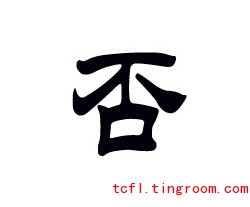
1. Learn Chinese--用“不”的否定句
yòng zài dòng cí 、 xíng róng cí hé qí tā fù cí qián biǎo shì fǒu dìng
用在动词、形容词和其他副词前表示否定
be/can/do not
e.g.
tā bù zǒu le 。
他不走了。
He's not going.; He's decided to stay.
yǒu rén shuō ké yǐ , yǒu rén shuō bù ké yǐ 。
有人说可以,有人说不可以。
Some say yes; some say no.
tā kè zhì zì jǐ bù chī ròu hé táng guǒ 。
她克制自己不吃肉和糖果。
She allowed herself no meat and sweets.
2. Learn Chinese--用“没”的否定句
bú jù yǒu ; bù cún zài
不具有;不存在: not have; there is not; be without
e.g.
nǐ méi péng you ma ?
你没朋友吗?
Had you no friends?
wǒ men jīn tiān xià wǔ méi kè 。
我们今天下午没课。
We have no lessons this afternoon.
wū lǐ méi rén 。
屋里没人。
There isn't anyone in the room.
3. Learn Chinese--用“别”的否定句
bú yào
不要 : do not
e.g.
gào su tā men bié děng le 。
告诉他们别等了。
Tell them not to wait.
wǒ dào shì quàn nǐ bié zhè yàng zuò 。
我倒是劝你别这样做。
I should advise you not to do that.
 English
English Japanese
Japanese Korean
Korean French
French German
German Spanish
Spanish Italian
Italian Arab
Arab Portuguese
Portuguese Vietnamese
Vietnamese Russian
Russian Finnish
Finnish Thai
Thai dk
dk